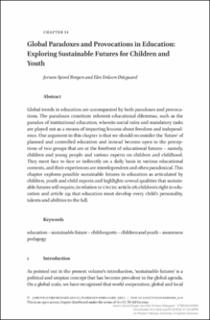Global Paradoxes and Provocations in Education: Exploring Sustainable Futures for Children and Youth
Chapter
Published version
Permanent lenke
https://hdl.handle.net/11250/2997612Utgivelsesdato
2021Metadata
Vis full innførselSamlinger
Originalversjon
Borgen, J. S., & Ødegaard, E. E. (2020). Global Paradoxes and Provocations in Education: Exploring Sustainable Futures for Children and Youth. I E. E. Ødegaard & J. S. Borgen (Red.), Childhood Cultures in Transformation (s. 274-296). Brill. https://doi.org/10.1163/9789004445666_014Sammendrag
Global trends in education are accompanied by both paradoxes and provocations. The paradoxes constitute inherent educational dilemmas, such as the paradox of institutional education, wherein social rules and mandatory tasks are played out as a means of imparting lessons about freedom and independence. Our argument in this chapter is that we should reconsider the ‘future’ of planned and controlled education and instead become open to the perceptions of two groups that are at the forefront of educational futures – namely, children and young people and various experts on children and childhood. They meet face to face or indirectly on a daily basis in various educational contexts, and their experiences are interdependent and often paradoxical. This chapter explores possible sustainable futures in education as articulated by children, youth and child experts and highlights several qualities that sustainable futures will require, in relation to UNCRC article 28; children’s right to education and article 29; that education must develop every child’s personality,talents and abilities to the full.

